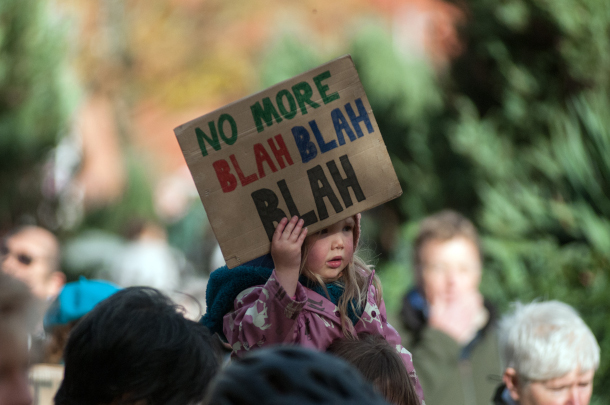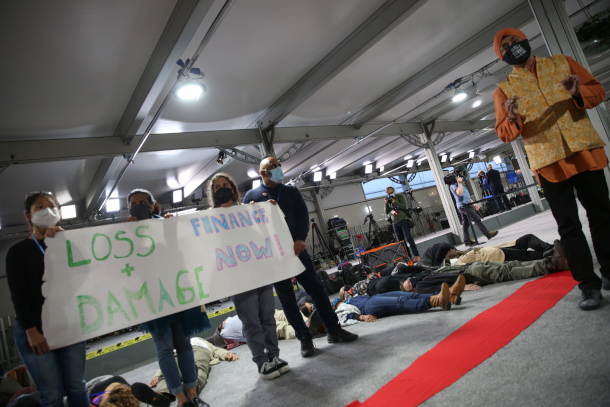Little Progress at COP26
Air Date: Week of November 19, 2021

Youth climate activist Greta Thunberg denounced the climate talks by calling for “no more blah blah blah”. The image above was taken at a 4,000 people rally outside Sheffield’s City Hall at the time of COP 26. Protesters were demanding greater action from world leaders on reducing greenhouse gas emissions and addressing the climate catastrophe. (Photo: Tim Dennell, Flickr, CC BY-NC 2.0)
The COP26 climate talks in Glasgow, Scotland brought mixed results with an agreement to phase down coal, side agreements to cut methane emissions and a rulebook for international carbon trading markets. But there was little progress in efforts to help developing countries cope with the effects of climate change and the talks were widely criticized for their lack of inclusivity. Most importantly, COP26 failed to establish a fully credible path to limit global warming to 1.5 degrees Celsius. Alden Meyer, a Senior Associate at the think tank E3G, joined Host Steve Curwood to discuss the outcomes of COP26 and look ahead at what's left to be done.
Transcript
BASCOMB: It’s Living on Earth, I’m Bobby Bascomb
CURWOOD: And I’m Steve Curwood
The COP26 climate negotiations in Glasgow have come to an end leaving much unsolved in terms of how we will limit global warming to 1.5 degrees Celsius by the end of the century. These talks have been criticized for lack of inclusivity and for hosting more than 500 attendees with links to fossil fuel interests. The current pledges, or nationally determined contributions under the Paris Climate Agreement, would only limit global warming to about 2.4C, which could result in millions of deaths. So countries are now tasked to set even more ambitious targets by next year's round of climate talks in Egypt. Joining us for an overview of what was accomplished and what’s left to be done is Alden Meyer, a Senior Associate at the think tank E3G. Welcome back to Living on Earth Alden!
MYERS: Great to be with you again Steve.
CURWOOD: Let's talk about what just happened there. So at the last minute they yank the cord when it comes to phasing out coal, what needs to happen in the next round of negotiations to deal with coal?
MYERS: Well, actually, this was a real breakthrough. This is the first time in the history of the COPs where there's been a reference to the need to phase down any fossil fuels in the final decision. So we need to start there and you have to remember, at the G20 Leaders Summit, just before the cops started held in Rome, they weren't able to get agreement on saying something about phasing out or phasing down coal. So this was really some progress. And of course, we know that countries like China and India are not going to phase down coal entirely by 2030. So having this in there will be important and the key will be what will these countries come back with next year in Egypt in terms of what they're willing to do to start phasing down coal.
I am incredibly grateful to everyone who has helped get us here today in Glasgow
— Alok Sharma (@AlokSharma_RDG) November 13, 2021
But this is a fragile win
We have to continue to work together to kept 1.5 alive
Read my full statement here on the outcomes of #COP26: https://t.co/SHP22t3bDc pic.twitter.com/8xSCZA7I10
CURWOOD: What's the difference between phasing out and phasing down by the way?
MYERS: Well, phasing out implies getting to zero and phasing down means reversing the increase and starting to reduce. So phasing out is clearly stronger and that was the original proposal from the UK presidency. And we had this drama at the last minute that China and India raised objections to that, and forced revision of the language from phase out to phase down. We're told that China expected others to object to this and get it taken out of the final decision before they even had to have a floor fight and where caught a little unaware. India was the one that took the lead, proposing and reading out the revised language on the floor.
CURWOOD: Hey Alden, let's talk about loss and damage. The rich nations apparently didn't want a standalone deal on this, so what can be done about it? A lot of talk but so far, not so much action right?
MYERS: Well, first, let's clarify for people what loss and damage is. President Obama's science advisor John Holdren once famously said, we're going to deal with climate change through a mix of three strategies, mitigation, adaptation and suffering, and loss and damage is really the suffering. It's the impacts that countries are already experiencing, and communities around the world from typhoons and hurricanes to wildfires to floods, other extreme climate impacts, and those impacts are mounting year by year. Loss and damage is a provision of the Paris Agreement. It's added to adaptation and mitigation, and there's a responsibility to start to address it. But for the last eight years or so there's really been very little movement from the developed countries on their willingness to provide resources, finance and technology support and other things to these countries to deal with loss and damage. That really came to a head in Glasgow, that was a more high profile issue than it's ever been in this process. The developing countries were pushing for what they called a facility to be operating under the UN framework on climate change, which would start looking at ways to generate substantial resources to help them cope with these impacts. The US and others opposed, creating a new facility but they did agree to four dialogues over the next two years to start talking about this issue. That's clearly not what the developing countries wanted. But its progress and will provide a pretty high profile political platform to start having that discussion about how we actually mobilize substantial resources to help these countries.

Members of the Civil Society Action Network calling for action on loss and damage at the COP26 climate talks. (Photo: Kiara Worth, Flickr, Civil Society Action, CC BY-NC-SA 2.0)
CURWOOD: And when you use facility, really, you're talking about money, you're talking about funds?
MYERS: Talking about money. It would be a mechanism under the the Framework Convention to generate and handle funding coming through. But of course, the fear of the US, Europe and others, is that they will be held accountable for their historical emissions. The US, Europe, Japan, and others still have some of the highest cumulative emissions over the last century or so and there's this fear of being subjected to open ended liability or compensation for those emissions.
CURWOOD: Let's talk about more money issues. There's a whole question of climate finance, this promise that was made in Copenhagen that was supposed to begin in 2020. Whatever happened with that?
MYERS: Well, it's always been a perennial issue at these meetings. It was high profile at this one loss and damage finance was of course, part of that adaptation finance was on the agenda and the developed countries did agree that they would try to double the amount of finance support coming from them for adaptation activities in developing countries, between now and 2025. So that was a win for the developing countries. The other issue of course was the developed countries have not yet met their commitment that they made 12 years ago in Copenhagen to provide $100 billion a year in finance for mitigation and adaptation, that was discussed. There was agreement that they needed to do better at meeting that target and to make up for the shortfalls in the first few years of of this decade if they can before that commitment ends in 2025. The third issue, big issue on finances is what happens after 2025? There's general agreement that we need to ramp up the amount of finance going to developing countries and they launched a process to negotiating that issue over the next two or three years. One of the big fall lines there as the US and other developed countries want to expand the base of donors to include China, Saudi Arabia, other relatively wealthy developing countries and of course, that will be a huge battle.
CURWOOD: Now one of the things that looks like it got done in Glasgow also involves money, and this is the trading of emissions reduction credit. Talk to me about the rules of the road for this process and what exactly was agreed to in Glasgow?
"Unless COP26’s failure is recognized as failure, there is no way to learn from it. Allowing global leaders to feel that what happened in Glasgow was acceptable — and spinning it as some sort of success — would be a disastrous mistake." #COP26 https://t.co/6mNJfCXGyb
— Greta Thunberg (@GretaThunberg) November 17, 2021
MYERS: Well, this is an issue that was supposed to be resolved three years ago at the COP and Katowice, Poland. And of course, they couldn't reach agreement there. They couldn't reach agreement in 2019 in Madrid. And so this was kind of the third time up at bat for this issue. And the UK and others were able to get it across the finish line, they adopted rules for what's called the Article Six of the Paris Agreement use of market mechanisms. And you know, the carbon markets are existing, they're out there on a bilateral basis, a number of companies are using offsets to deal with their emissions but this is to set up a global regime and sort of rules for the road. They did reach agreement on it, it's not perfect, it still will allow some carryover of sort of bogus credits under the Kyoto regime into the Paris regime, which will water down the system a little bit. But it's a pretty good system. And of course, the countries like Europe and the US and others that are protecting environmental integrity now have to make sure that they don't buy any bogus credits or tons of emissions reductions from from countries. So it'll go forward, it's good to have it resolved and off the radar screen. I think there's an open question about how large this market will grow over time. There's also a question of what is the role for offsets overall, in a world where we're trying to get to net zero emissions, if everyone has to get to zero, you can't really have a lot of trading going on. So this is a work in progress and we'll see how the market develops over the next several years.
CURWOOD: How appropriate is the negotiation process that we're in right now with these conferences of the parties, these these cops? Because, you know, I don't know that nature and science care, that we're disputing things and not coming to agreement?
MYERS: No, they don't. The atmosphere responds to one thing which is emissions, it really doesn't care much about what leaders say what treaties we adopt, what protocols we put in place, it responds to physics. And we're not doing very well on that front, we're still on track for an increase of about 10 to 15%, above current levels by 2030, as opposed to the 45% reduction that we need. So that's the bad news.
CURWOOD: At the end of the process, as the President of the Conference of the Parties is a British member of parliament brought the gavel down, Alok Sharma, he also took time to apologize. Why did he feel that he had to apologize?
MYERS: He apologized because there was sort of an irregular issue that came up at the end where China and India were not willing to accept the final language on the phase out of coal and the phase down of fossil fuel subsidies. It was not a transparent process, these countries basically came to him and said they would block the entire agreement, all the package that we had spent two weeks negotiating or actually two years negotiating, If they didn't get their way on this. You saw a number of angry statements from countries after India made this proposal that, first of all, they didn't agree with a proposal, they said we need to phase out coal if we're going to have any chance of 1.5 C. They also didn't like the process. They said, look I've got issues I would like to raise and I would like to approve the agreement, I was not given that opportunity and this was not done in a very transparent way. And they were basically objecting to the threats that India and China were making to block the whole package if they didn't get their way in watering this coal language. And that's when you saw President Sharma apologize to the rest of the countries there for the process and how it had played out and he really got quite emotional and kind of teared up at the end of that it was quite a dramatic moment.

Alden Meyer is a Senior Associate at E3G working on US and international climate policy and politics. He is a Principal at Performance Partners, which provides a range of consulting services to clients in government, business, and the non-profit sector. (Photo: Courtesy of Alden Meyer)
CURWOOD: Should the world be crying too?
MYERS: I think you could say the world should be crying. I mean, there is a total disconnect between the rhetoric of many of these leaders that climate change is an existential crisis and their behavior, which in many cases is going about their business as if nothing was happening. I mean, I don't know on the one hand how you can say our future and our way of life and our children are at risk and then do so little to address it. Now, of course that varies that's the dynamic here. This is 196 countries, some of them are making truly transformational commitments. Denmark, for example, is committed to reduce its emissions by 70% by the year 2030 but other countries aren't stepping up to the plate. And I would say also that the US and other developed countries really haven't done as much as we should to provide the financial resources to help these countries decarbonize. There was an announcement made during the first week about an agreement reached with South Africa between Europe, the US, the UK, and others to provide somewhere around eight and a half billion dollars to help them shift away from coal. That's the kind of thing we need to see happen with other big countries like India, Indonesia and others. We're running out of time. Ten, fiffty, one-hundred years from now our future generations will be looking back at us and saying: why didn't you do more? Why didn't you really step up? You said it was an existential crisis, but you didn't behave like it. Why not? And I think they'll be perfectly justified in asking that question.
CURWOOD: Alden Meyer is a senior associate at the think tank E3G. Thank you so much Alden for taking the time with us once again.
MYERS: Thanks, Steve. I enjoyed it.
Links
BBC |” What Was Agreed at the Glasgow Climate Conference”
Global Witness | “Hundreds of Fossil Fuel Lobbyists Flooding COP26 Climate Talks”
The Guardian | “‘A Death Sentence’: Indigenous Climate Activists Denounce COP26 Deal”
Human Rights Watch “COP26 Is Over – What’s Next for Forests, Coal, and Fossil Fuel Finance?”
Living on Earth wants to hear from you!
Living on Earth
62 Calef Highway, Suite 212
Lee, NH 03861
Telephone: 617-287-4121
E-mail: comments@loe.org
Newsletter [Click here]
Donate to Living on Earth!
Living on Earth is an independent media program and relies entirely on contributions from listeners and institutions supporting public service. Please donate now to preserve an independent environmental voice.
NewsletterLiving on Earth offers a weekly delivery of the show's rundown to your mailbox. Sign up for our newsletter today!
 Sailors For The Sea: Be the change you want to sea.
Sailors For The Sea: Be the change you want to sea.
 The Grantham Foundation for the Protection of the Environment: Committed to protecting and improving the health of the global environment.
The Grantham Foundation for the Protection of the Environment: Committed to protecting and improving the health of the global environment.
 Contribute to Living on Earth and receive, as our gift to you, an archival print of one of Mark Seth Lender's extraordinary wildlife photographs. Follow the link to see Mark's current collection of photographs.
Contribute to Living on Earth and receive, as our gift to you, an archival print of one of Mark Seth Lender's extraordinary wildlife photographs. Follow the link to see Mark's current collection of photographs.
 Buy a signed copy of Mark Seth Lender's book Smeagull the Seagull & support Living on Earth
Buy a signed copy of Mark Seth Lender's book Smeagull the Seagull & support Living on Earth

